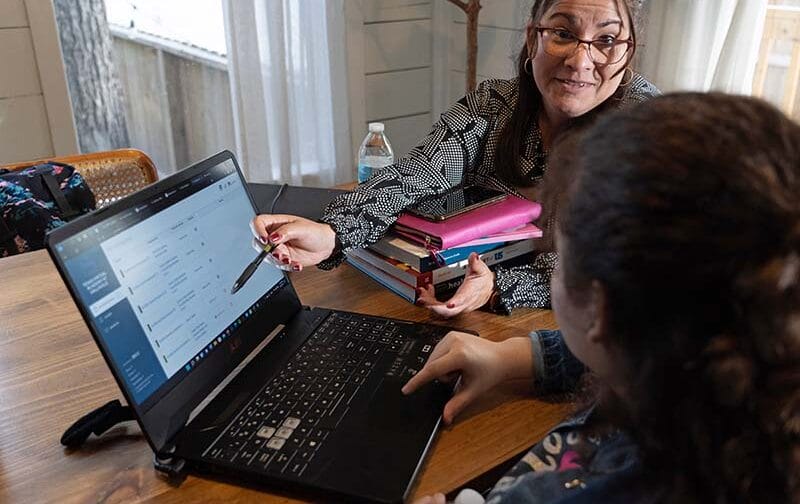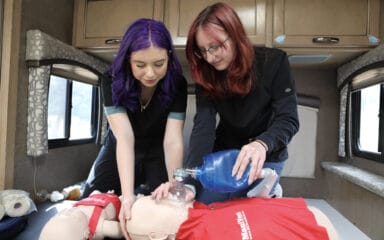How to Address Your Child’s School Concerns Before the New School Year

“But I don’t want to go to school,” your child groans as you wake them up. While this is a common sentiment, it can sometimes signal deeper issues. As parents, it’s crucial to recognize when our children’s complaints go beyond the typical morning protest and warrant our attention.
A number of telltale signs can indicate that your child is struggling with their current school setup, so it’s important to be attuned to subtle shifts in their attitude and behavior — poor grades, complaints of headaches or stomach aches, sleeping issues, trouble concentrating, withdrawing from friends and hobbies, and indecisiveness, to name a few. These signs may seem minor at first, but they can escalate if left unaddressed, potentially affecting your child’s overall well-being and academic performance. When academic struggles are paired with social challenges, it’s essential to evaluate whether your child’s current school environment is truly supportive.
To address these concerns before the new school year, start with an open and honest discussion about their academic and social experiences, reassuring them that their concerns can be shared without judgment.
Traditional schools often use a one-size-fits-all approach, which can leave some students feeling overwhelmed or unmotivated, while gifted learners may face boredom and disengagement. Although only 6.6% of U.S. students are in gifted programs, up to 3.6 million students who could benefit from such programs are not adequately served.
Social issues, including subtle bullying and toxic friendships, can also impact a child’s school experience. Over 20% of students aged 12 to 18 report being bullied at school, and simply encouraging them to make new friends or join clubs may not be sufficient.
Once it becomes apparent that their current school environment isn’t meeting their needs, it’s crucial to consider alternatives. The summer break is the perfect time to explore different educational options that could enrich their learning and social interactions in the upcoming school year. This may include:
Researching public school open enrollment
Most students who attend traditional public schools are assigned to a school based on boundary maps and zoning, but most states now have laws that allow school transfers and boundary exceptions.
Considering alternative school options
If traditional public school is not the right fit for your child, many alternative learning environments provide the opportunity to focus on an area of interest or study, change the pace of learning or accommodate learning style preferences.
- Charter schools: Public and tuition-free, often with specialized curriculums.
- Homeschooling: Offers flexibility in curriculum and daily structure.
- Private or independent schools: Tuition-based, with opportunities for scholarships, vouchers, and education savings accounts.
- Schools with career clusters and pathways: Focus on specific interests and skills to aid transition to college or careers.
- Online schools: Provide flexible, customizable learning environments.
Many families have found success with K12-powered online schools, which offer an award-winning curriculum and a wide range of enrichment and socialization opportunities. The K12 Zone, for instance, is a virtual campus where students can connect, participate in clubs, and engage in activities in a secure setting.
K12 high school students can also get a jump start on their future by enrolling in one of 30 career pathways, integrating specialized courses into their regular curriculum where students can work toward certifications, earn college credits through dual enrollment and learn technical skills for their desired career path. These pathways can also give them a greater sense of purpose in their high school experience.
As parents, our role in our children’s education goes beyond just helping with homework. By taking a deeper look at their past school year, you can help ensure a more positive and fulfilling school experience in the upcoming year. Often, this involves finding the right educational fit. Recognizing the unique needs of your child and finding the best learning environment can make a significant difference in their overall well-being, development and happiness. Learn more about the high school experience at ITCA to see how our exceptional teachers and flexible structure can help your child thrive.
For more details on alternative education options and finding the right fit for your child, reach out to us today! here.
Kerry Wysocki is the ITCA board chair and the general manager of Northwest Machining & Manufacturing Inc., a precision machine shop that manufactures parts for the aerospace, nuclear, defense and oil field industries and others. Wysocki also volunteers on the CWI and the Dennis Center Manufacturing Advisory Committees and works as an Idaho SkillsUSA Machining and Manufacturing event coordinator.



